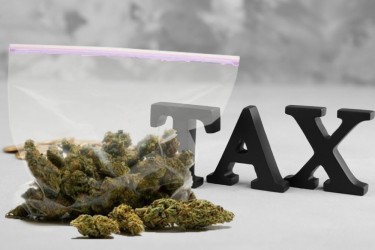
The IRS has released a new memorandum to clarify reporting regulations concerning substantial cash transactions within the marijuana industry. According to the agency, such transactions should not automatically trigger suspicion solely due to the industry's federally prohibited status.
The memo addresses inquiries regarding Form 8300, a mandatory document for cannabis businesses receiving cash payments exceeding $10,000. Charles Hall, special counsel at the IRS, stated, "The memorandum offers insights into various concerns through a question-and-answer format." He added that the IRS is actively developing further guidance, particularly concerning cash transportation between growers/manufacturers and dispensaries/sellers via couriers or armored vehicles.
Subheading 1: IRS Guidance on Cash Transactions in the Marijuana Industry
The document offers guidance on various compliance matters, including recommended approaches to identifying the nature of businesses receiving cash payments. It suggests that companies may opt to disclose their association with "marijuana," but those preferring not to specify could select alternative categories more closely aligned with general agricultural product classifications.
Of particular note, despite the longstanding guidance from the federal Financial Crimes Enforcement Network (FinCEN) mandating financial institutions to submit suspicious activity reports (SARs) for clients involved in cannabis businesses, the IRS emphasized that businesses should not automatically mark a checkbox designated for suspicious cash transactions solely due to their involvement in the marijuana industry.
The guidance addresses a query: "Is it appropriate for a legalized substance business to tick the suspicious activity box merely because of the nature of their product?" The response states:
"Answer: No. Using the suspicious activity box solely as a defensive measure, akin to a Money Service Business filing defensive Significant Activity Reports, constitutes an inappropriate use of that box. If businesses mark the box solely due to their industry affiliation and without other justifiable reasons, this constitutes misuse. In such cases, agents should advise them that continued marking of the box could lead to penalties for inaccurate form completion. Naturally, this determination hinges on the specifics of each individual case."
The guidance, dated January 22nd but newly published online this month, also explores several hypothetical scenarios concerning Form 8300 within the realm of cannabis companies. One such scenario is outlined below:
"Scenario 1: Company A operates as a marijuana manufacturer. It establishes a separate subsidiary, Company B, tasked with distributing cannabis products. Company A and Company B are distinct legal entities with different Employer Identification Numbers (EINs). Company B provides cash to Company A for purchasing products to sell. Is filing Form 8300 necessary?
Scenario 1 Answer: Given that the cash transaction occurred within the scope of business and involves separate legal entities (each with its own EIN), Company A is required to file Form 8300 upon receiving cash from Company B if it exceeds $10,000."
While the memo explicitly states that it "may not be used or cited as precedent," it does not signify any policy alterations. However, it serves as another instance highlighting the ongoing confusion stemming from the disparity between state and federal marijuana laws, necessitating industry-specific guidance.
Subheading 2: Praise for IRS Leadership in Tax Treatment of State-Legal Cannabis Businesses
Representative Earl Blumenauer (D-OR), one of the founding co-chairs of the Congressional Cannabis Caucus, commended the IRS for demonstrating the necessary leadership from federal agencies.
In an interview on Tuesday, Blumenauer remarked, "This marks a modest yet significant and logical progression in how our tax system handles state-legal cannabis enterprises."
While federal law maintains cannabis prohibition, tax regulations still mandate individuals to report and pay taxes on earnings generated from the sale of controlled substances, including those through state-sanctioned marijuana businesses or the unregulated market.
Nevertheless, marijuana businesses are barred from claiming federal tax deductions on such earnings, irrespective of state authorization, due to IRS Code Section 280E. The IRS clarified this policy for medical cannabis businesses in 2022.
Industry participants are keen for this to alter as quickly as possible, particularly in light of the Drug Enforcement Administration's (DEA) ongoing examination of cannabis scheduling. Moving marijuana to Schedule III under the Controlled Substances Act (CSA) would allow cannabis firms to take advantage of deductions that are available to other conventional industries, according to a recommendation made by the U.S. Department of Health and Human Services (HHS).
Moreover, marijuana companies have encountered distinct hurdles in obtaining banking services and other financial resources due to cannabis's federal prohibition. Senate Majority Leader Chuck Schumer (D-NY) highlighted in an interview this month that passing bipartisan cannabis banking legislation to address this issue ranks among his priorities before November.
Implications for the Evolving Landscape of Cannabis Regulation
The subtle approach taken by the IRS memorandum to cash transactions in the marijuana industry is indicative of the evolving state and federal regulations around cannabis. There's a rising demand for uniformity and clarity in federal agency interactions with cannabis-related enterprises as more states continue to legalize the drug for both medicinal and recreational purposes.
The IRS recognizes the intricacies of the cannabis sector and the hurdles that legal firms encounter by offering guidelines that stresses a case-by-case examination rather than blanket suspicion based on industry participation. This strategy demonstrates a willingness to adapt to the evolving regulatory landscape and strive toward a more practical and equal handling of state-legal cannabis businesses.
The memorandum does, however, also underline the continuous conflict between federal and state cannabis laws, emphasizing the necessity for extensive federal change. The IRS guidance reminds lawmakers that there is an urgent need for coherent and consistent regulatory frameworks that support the growth and legitimacy of the cannabis industry, particularly as they grapple with issues like tax policy, banking access, and cannabis rescheduling under the Controlled Substances Act.
Bottom Line
The IRS memorandum regarding cash transactions in the marijuana industry reflects a nuanced approach to regulation amidst evolving state and federal laws. While providing clarity for cannabis businesses on reporting requirements, it also underscores the ongoing discord between federal and state regulations. The guidance highlights the need for comprehensive federal reform to ensure a coherent and equitable regulatory framework for the cannabis industry, addressing issues such as tax policy, banking access, and rescheduling.
THE IRS' 280E TAX CODE, THE BANE OF THE WEED INDUSTRY, READ ON...
WHAT IS THE IRS 280E TAX CODE AND WHY IS IT KILLING THE WEED BIZ?






